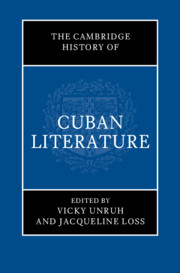Book contents
- The Cambridge History of Cuban Literature
- The Cambridge History of Cuban Literature
- Copyright page
- Dedication
- Contents
- Figures
- Contributors
- Acknowledgments
- Introduction Unfinished Histories
- Part I Literature in the Early Colony
- Part II Cuban Literature’s Long Nineteenth Century
- Part III Literary and Intellectual Culture in the Twentieth-Century Republic
- Part IV The Revolution’s Literary-Cultural Initiatives and Their Early Discontents
- 22 Beginnings
- 23 Imagining Cuba’s New Revolutionary Communities Through Film (1959–1989)
- 24 Shaping New Cultural Literacies
- 25 The Social Life of Music in Cuban Literary Culture
- 26 Casa de las Américas and Revolutionary Configurations of Latinoamericanismo
- 27 The Travels of Fiction in the Cuban Diaspora
- 28 Cuba’s Poetic Imaginary (1959–1989)
- 29 The Artistic Worlds of Guillermo Cabrera Infante
- 30 The Diasporic Odysseys of Reinaldo Arenas and His Writings
- Part V Cuba and Its Diasporas into the New Millennium
- Epilogue
- Select Bibliography
- Index
- References
25 - The Social Life of Music in Cuban Literary Culture
from Part IV - The Revolution’s Literary-Cultural Initiatives and Their Early Discontents
Published online by Cambridge University Press: aN Invalid Date NaN
- The Cambridge History of Cuban Literature
- The Cambridge History of Cuban Literature
- Copyright page
- Dedication
- Contents
- Figures
- Contributors
- Acknowledgments
- Introduction Unfinished Histories
- Part I Literature in the Early Colony
- Part II Cuban Literature’s Long Nineteenth Century
- Part III Literary and Intellectual Culture in the Twentieth-Century Republic
- Part IV The Revolution’s Literary-Cultural Initiatives and Their Early Discontents
- 22 Beginnings
- 23 Imagining Cuba’s New Revolutionary Communities Through Film (1959–1989)
- 24 Shaping New Cultural Literacies
- 25 The Social Life of Music in Cuban Literary Culture
- 26 Casa de las Américas and Revolutionary Configurations of Latinoamericanismo
- 27 The Travels of Fiction in the Cuban Diaspora
- 28 Cuba’s Poetic Imaginary (1959–1989)
- 29 The Artistic Worlds of Guillermo Cabrera Infante
- 30 The Diasporic Odysseys of Reinaldo Arenas and His Writings
- Part V Cuba and Its Diasporas into the New Millennium
- Epilogue
- Select Bibliography
- Index
- References
Summary
This chapter argues that reading music and musicians is fundamental to understanding Cuban literature and its temporality, geography, and community-formation. After tracing some of the standard ways in which critics have aimed to connect music to the literary, the chapter suggests more social approaches to what it might mean for literary or cultural studies scholars to take music in more fully as part of social life. This conception of the social, the chapter argues, is not one to which a new or revolutionary socialism aspired after Cuba’s revolution, but rather something more ancient, less prescribed, more improvisatory, and experienced with others. Attention to popular music and the worlds it forges through the chapter’s analysis of a postrevolutionary musical primer, as well as to lyrics, sounds, and even visuality, grounds the chapter’s conception of music as an entrée into epochs beyond the historical confines of a particular musical entity or event. The complete somatic experience of music’s nuance, irony, submerged histories, happenings, and temporal overlaps can enliven and expand what literary scholars might conceptualize as an individualized “close reading.”
Keywords
- Type
- Chapter
- Information
- The Cambridge History of Cuban Literature , pp. 397 - 410Publisher: Cambridge University PressPrint publication year: 2024



